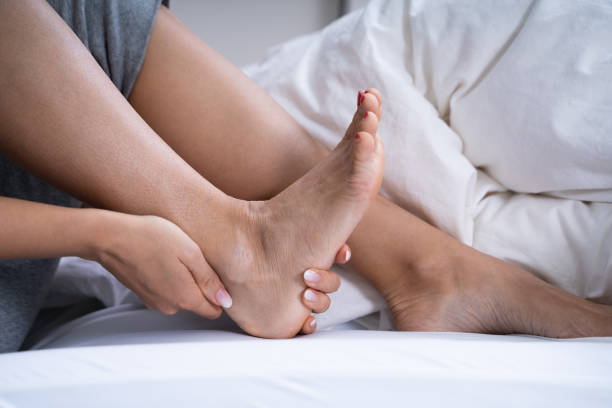Achilles Tendinitis | Achilles Tendon Rupture in Allentown

Achilles Tendinitis is a common overuse injury which results in inflammation of the achilles tendon, most frequently causing mild to severe heel pain.
The achilles tendon is the largest tendon in the body, connecting your calf muscle to your heel bone. It’s used with every step – when you walk, run, and jump.
Although the Achilles tendon can withstand great stresses, it’s also prone to tendinitis. The condition is very common in athletes, especially runners who’ve suddenly increased the intensity or duration of their workouts. It’s also common in middle-aged, “weekend athletes” who play sports like tennis or basketball only occasionally.
The pain from achilles tendinitis may be felt anywhere from the back of the leg to the top of the heel. Most cases are mild and can be treated at home under a podiatrist’s supervision. Severe cases of Achilles tendinitis can lead to tendon tears (ruptures) that may require surgical repair.
See our page on the FAST Technique, an alternative to open surgery to treat heel pain caused by Achilles tendinitis
Achilles tendinitis may be caused by:
- Intensive hill running, sprinting, or stair climbing
- Overuse resulting from the natural lack of flexibility in the calf muscles
- Rapidly increasing intensity of exercise, especially after a period of inactivity
- Sudden and/or hard contraction of the calf muscles when exerting extra effort, like that in a final sprint or high jump
Symptoms of Achilles tendinitis and tendinosis:
- Recurring localized heel pain, sometimes severe, along the achilles tendon during or after exercise
- Pain often begins after exercise and gradually worsens
- Morning tenderness or stiffness about an inch and a half above the point where the Achilles tendon is attached to the heel bone
- Sluggishness in your leg
- Mild to severe swelling
- Stiffness that generally diminishes as the tendon warms up with use
Treatment for Achilles tendinitis
Your podiatrist at PA Foot and Ankle Associates may recommend one or more of these treatments to manage your pain:
- A bandage specifically designed to restrict motion of the tendon
- Over the counter, non-steroidal anti-inflammatory medication (ibuprofen)
- Custom orthotic shoe inserts to relieve stress on the tendon
- Rest
- Switching to a low impact exercise such as swimming, that does not stress the tendon
- Stretching, massage, ultrasound and appropriate exercises to strengthen the muscles that support the achilles tendon
In extreme cases, surgery is necessary to remove the damaged tissue and repair any tears.


